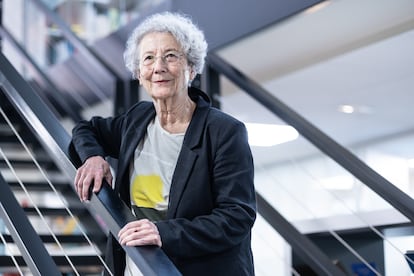Carmen Estrada, neuroscientist: ‘Science and God cannot coexist’
In ‘The Inheritance of Eve,’ the Spanish researcher and classical philologist claims the biblical character as a symbol of science, curiosity, and the transmission of knowledge

For most of her career, the physiologist Carmen Estrada, 74, dedicated herself to scientific research, specializing in the blood supply of the brain and its ability to form new neurons throughout life. “The more we exercise a function, the more neurons are recruited, so we can model our brain,” she says. After retiring, this native of Seville, in southern Spain, turned her career around: she studied and graduated in Greek philology. After publishing a first book about the adventures of her father, José Estrada, a young socialist who was deputy mayor of Seville when the Spanish Civil War broke out in 1936 and who fled from Franco’s rebels with the help of a far-right Falangist friend, there was a second one about the role of women in Homer’s The Odyssey. Now, Estrada has just published La herencia de Eva [The Inheritance of Eve], a book in which she traces the history of science, its influence on culture and its current role in society.
Question. Many people come to the humanities fleeing the sciences, but almost no one comes to the sciences fleeing the humanities, why is that?
Answer. Due to an incorrect idea of what science is. I try to convey a more open vision that does not focus only on mathematics and physics, for which, I believe, you must have a special mind. Science has a much broader scope. It is about observing the world and trying to explain it by natural causes. This can be done in many subjects. However, when kids in high school have to choose between science and the humanities, they are not offered this other side of science. If the majority of people saw that range of possibilities, perhaps they would have a more scientific attitude and would be less fooled by pseudoscience.
Q. Are we more or less gullible than in times past?
A. Human credulity remains the same. What happens is that now we have a tailored bombardment through mobile phones. The information we are providing is being used by algorithms, which will send you the content to which they believe you are most vulnerable, in order to convince you to consume, which is the ultimate goal.
Q. Is there a good side to technology that offsets this problem?
A. The internet is wonderful. I couldn’t have written this book without it. But what are we giving in return? It would be necessary to have ethical control of the technology. But since the dominant thing is not ethics, but business, we are lost.

Q. You warn against faith in science.
A. It’s a contradiction. Science and faith are antagonistic. But there are people, especially in the business and technology world, who blindly believe in science as the solution to all our problems, as long as people continue to consume. And then there is the other extreme.
Q. Which one?
A. The one that some environmentalists maintain. Their message is: if you are told that science says so, be suspicious. There are books that go so far as to say that Descartes is to blame for global warming. Because it was in the 17th century when the thought was born that science should be at the service of humans, that we are the owners of the planet. And from there we are already lost. They themselves fall into pseudoscience. They say ‘don’t buy the drugs, because what the pharmaceutical companies want is to do business’ — which is true. But instead they say ‘buy this other product that my cousin told me about and which is sold by a herbalist.’ Distrusting science in general and thinking that it will solve all the planet’s problems are two equally blind positions.
Q. Even so, in your book he maintains that science is the only thing that can get us out of the quagmire.
A. Science has to serve the human community. But who represents it? Economic interests are in control, and inequality is increasing. These are such basic contradictions that it would require us to stop and think, but that is not highly valued in our society. Everything goes very fast and you constantly have to be saying something clever and putting it on your mobile. Young people are growing up with that, and they have no other point of reference. It makes me very worried. I see my grandson very unprepared for today’s world, despite having a family that strives to give him the right tools, but the outside influence is stronger.
Q. Don’t you believe that everything will be corrected, that the next generation is always the best prepared one?
A. No. The current generation of young people will be very well prepared, but they are unmotivated, desperate, and frustrated. It’s a bad time to be young.
Q. What is Eve’s heritage that you defend in your book?
A. If you read about the myth of Eve freely — I used a direct translation of the Bible from Hebrew that is not so contaminated by the Church — what it says is that, guided by her instinct of curiosity, which is the instinct that guides science, Eve eats from the fruit of knowledge and then transmits it to others so they may continue it. Science is a collaborative and collective task. So Eve represents science, the instinct of curiosity, the acquisition and transmission of knowledge. The misogynistic interpretation that has been predominant until now maintains that the fruit was forbidden, so curiosity only leads to transgression. And hence this whole idea of guilt of the Judeo-Christian tradition, which has done a lot of damage.
P. Are science and God incompatible?
R. Yes, they cannot coexist. There are scientists who say they are believers, but either they are not believers or they are not scientists. A truth that is not demonstrated is not a scientific truth. God may exist as a hypothesis, but a demonstration of his existence has not been nor can ever be made. That is why they are incompatible.
Sign up for our weekly newsletter to get more English-language news coverage from EL PAÍS USA Edition
Tu suscripción se está usando en otro dispositivo
¿Quieres añadir otro usuario a tu suscripción?
Si continúas leyendo en este dispositivo, no se podrá leer en el otro.
FlechaTu suscripción se está usando en otro dispositivo y solo puedes acceder a EL PAÍS desde un dispositivo a la vez.
Si quieres compartir tu cuenta, cambia tu suscripción a la modalidad Premium, así podrás añadir otro usuario. Cada uno accederá con su propia cuenta de email, lo que os permitirá personalizar vuestra experiencia en EL PAÍS.
¿Tienes una suscripción de empresa? Accede aquí para contratar más cuentas.
En el caso de no saber quién está usando tu cuenta, te recomendamos cambiar tu contraseña aquí.
Si decides continuar compartiendo tu cuenta, este mensaje se mostrará en tu dispositivo y en el de la otra persona que está usando tu cuenta de forma indefinida, afectando a tu experiencia de lectura. Puedes consultar aquí los términos y condiciones de la suscripción digital.









































